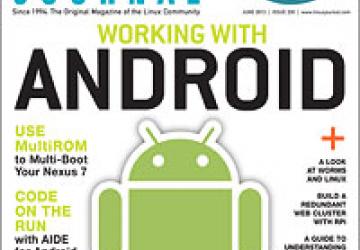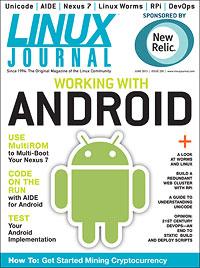June 2013 Issue of Linux Journal: Android


The Face of a Toaster
Science-fiction geeks have very specific definitions for their (okay, "our") jargon. A cyborg is a hybrid mechanical and organic creature. An AI (artificial intelligence) is a purely electronic device or program capable of thought. And an android is a purely mechanical and electronic device with a human appearance. In Star Trek terms, the Borg are cyborgs, and Data is an android. Then Google came and messed everything up. "Android" is now synonymous with the operating system on phones and tablets everywhere. Unless it's an obscure social commentary on square shapes and human obesity, I think it's safe to assume Google just went with a cool-sounding, futuristic name. This month, we focus on Google's Android, the Linux-based operating system that's taking over the planet.
Reuven M. Lerner starts out the issue with the universal translator of the programming world—namely, Unicode. Although it makes life easier all across the planet, working with Unicode can be challenging. Reuven addresses some of those challenges, and shows how to work through them. Dave Taylor helps us work through some things too as he continues his series on the Cribbage script we've been working on. Whether you want to learn scripting, or better understand Cribbage, it's an awesome series.
Kyle Rankin brings us another Raspberry Pi article this month, this time doing fault tolerance with redundant Web servers. Kyle's articles always make me hungry for knowledge, but the past couple months, his titles have made me hungry in general—Raspberry Pi, indeed. I, on the other hand, talk about cryptocurrency this month. It's been a while since I've mentioned Bitcoins or Litecoins, and with the recent bubble, perhaps it's time to dust off those miners and start generating cash. It's not a surefire way to get rich, but you might be able to earn enough income to buy some Raspberry Pi devices and keep up with Kyle!
Generally, developers develop computer programs on computers. They also develop mobile applications on computers. Joey Bernard shows us AIDE this month, which is a nifty way to develop Android apps while using the Android OS! If you've ever wanted to do some coding while on the road, but you're stuck with only your tablet, you'll want to check out this article. Nitish Tiwari delves into development this month as well, but he discusses testing side of things. If you want to port your application to new hardware, go directly to his article and start reading.
Bill Childers and I are kindred spirits when it comes to mobile technology. I think his pile of goodies is a little taller than mine, but thankfully, he shares his experiences with us all. A couple months back, I wrote about my Nexus 7 tablet. Bill goes in a slightly different direction with his Nexus 7, and he explains how to boot in to completely different ROMs! Whether you want to try CyanogenMod or Ubuntu on your tablet, MultiBOOT is your tool, and Bill describes how to use it.
At times, we can get arrogant about security as Linux users. Himanshu Arora looks deeper into viruses and worms. Are we safer by design? Are we setting ourselves up for disaster? Himanshu's article is a must-read for anyone interested in the debate. And finally, Tracy Ragan's opinion piece on DevOps is one that hits home to an old-timer like me. The scale of data centers is such that the traditional static scripts and hacks are being phased out by newer, truly automated systems.
If you think Android is a little green robot that lives in your phone, or if you think Google has blasphemed all of science fiction, this Android issue of Linux Journal should be enjoyable. I can't bring myself to make a cheesy comment like, "set phasers to awesome", so I'll just hope you enjoy this issue. We think it's awesome, phasers or no.
Available to Subscribers: June 1










